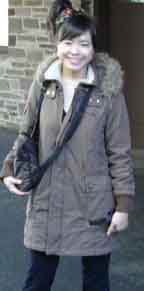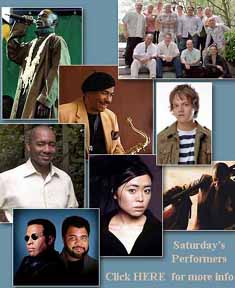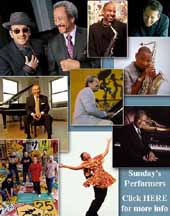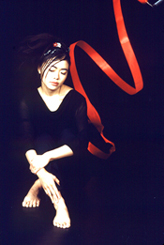INTERVIEW WITH HIROMI
“I wanted to bring what Jackie [Chan] does in Kung
Fu
to what I do on piano.” (Hiromi)
"Her music, together with her overwhelming
charm and spirit,
causes her to soar to unimaginable musical heights." (Ahmad Jamal)
BACKGROUND
US
ASIANS: When
did you noticed that you were described as a child prodigy and did this
create any additional pleasured or privileges in getting access to various
things/people?
HIROMI:
I have never really
noticed, so it did not create much.
US
ASIANS: Was
the attendance to practicing and taking piano lessons prompted by your
parents – in addition, did you rebelled against the needed practice
that was required as a child?
HIROMI:
My mother took me to
piano lessons, I always loved playing piano, so it was not too hard to
practice apart from playing Hannon.
US
ASIANS: Within
the Yamaha School of Music program at Shizuoka – where you attended
from the age 5 to 15, could you share what tangible/intrinsic/emotional
input that you experienced/taught that still resonates within your creative
soul (as a supplement to your private piano lessons) –
even today?
HIROMI:
I mainly studied composition
in Yamaha music school, I was studying piano with my private teacher,
she was very unique. She often told me to see colors when I play, when
she wanted me to play passionate, she asked me to “PLAY RED”,
when she wanted me to play melancholic, she asked me to “PLAY BLUE”,
she even colored my sheet music with color pencils, and it really made
kid’s imagination to develop.
US
ASIANS: What
are the guidelines, teachings and/or foundations that has allowed you
(as a musician and as a person) to remain humble while being thankful
of people who have supported you?
HIROMI:
It is just natural
behavior, I am standing here right now because of so many people’s
support.
 |
CREATIVE
& MUSIC BACKGROUND
US
ASIANS: Did
your first piano teacher’s energy and emotionalism continually perpetuate
your creative soul via osmosis in your playing?
HIROMI:
Yes,
she always told me to play from heart to heart, not from fingers to brain.
US
ASIANS: At
14, your appearance in Czechoslovakia to play with the Czech Philharmonic
must have been a memorable experience, could you share how this came about
and what images do you still carry with you from that performance?
HIROMI:
It was a day around
the time that Czech and Slovakia decided to get separated, I have a strong
impression that I was there in very big historical change, and of course
playing with such an amazing orchestra was a pure joy.
US
ASIANS: Did
the discipline of writing commercials (i.e. Nissan and others)
provide invaluable experience, skills and background in writing music
before arriving at Berklee College of Music in Boston?
HIROMI:
Writing jingles are
like scoring a short-film. Nissan commercial was fun, it was starred by
Rowan Atkinson (Mr.Bean), and I really had to make the music
comical, I often see visuals when I write music anyway, so it was very
natural to me to score.
US
ASIANS: How
did you enter this highly competitive world of “jingles” and
what companies did you create music for?
HIROMI:
Boss of one of the
top jingle company in Japan happened to see my live performance, and he
really liked my music, that’s how I got the gig, I did jingles for
Nissan, Rover Japan, Kao (cosmetics), Taisho-seiyaku (medicine),
etc.
US
ASIANS: Did
these experiences in writing jingles prompted/motivated your interest
in orchestration?
HIROMI:
Definitely yes, it
was my first chance to record a full orchestra, I was always interested
in orchestral work, but conducting a full orchestra was such a thrill,
like piloting a huge boat.
MY
MUSIC IS
"JUST THE UNION OF WHAT I LOVE
AND FEEL PASSIONATE ABOUT."
(Hiromi)
|
DIVERSITY
US
ASIANS: Considering
Asia’s ability to produce technically perfect musicians in droves,
why are only a small number are viewed as gifted interpreters or composers
– such as yourself and why do you think this is so of artists from
Asia?
HIROMI:
I think main reason
to it is because classical music is from Europe and jazz music is from
US, even though I am doing my OWN music, I studied music from different
cultures and history. It is like some Americans doing Sumo or Kabuki,
we really need to understand a deep and traditional part of it to be able
to explore something new.
US
ASIANS: What
experiences, skills, gifts and/or background allowed you the ability to
be an intuitive creative force?
HIROMI:
Passion for music,
and curiosity. It is just like climbing mountains, there is always a new
and exciting view whenever you climb higher, and I cannot wait for the
next view, so I make step by step every day.
US
ASIANS: In
acknowledgement of your adventurous spirit that led to be part of the
“third type” of Japanese nationals who made up 10% of the
Berklee’s student body (according to Gary Burton) that
hung out with everybody and anybody – as oppose to the other two
groups (Japanese students that only hung out with themselves or the Japanese
students that only hung out with Americans/non-Japanese) – what
were your experiences in adapting to another culture/language/mindset/climate-weather/musical
challenges/teaching styles?
HIROMI:
I am here to experience
another culture, so I am up for it, I am always full of curiosity, that
tells everything, I guess.
ENCOUNTERS
WITH JAZZ
US
ASIANS: Through
your first piano teacher, what aspect(s) of jazz that she had
shared with you that nurtured/created a musical curiosity with jazz?
HIROMI:
She
loved jazz music, so she had me listen to so many jazz Lps, my favorite
was Errol Garner and Oscar Peterson at that time.
US
ASIANS: How
did your first piano teacher successfully incorporate jazz and classical
together – along with the principals of improvising (not something
that is done within traditional classical music), since many people see
these as two separate disciplines that cannot be creatively integrated
together?
HIROMI:
I was falling asleep doing a
technical classical exercise such as Hannon, and she asked me to make
it swing, then my eyes started to shine, and I started to put some jazzy
chords to it, and I started to improvise on Mozart, Chopin, etc.
|
LIFE
AT BERKLEE
US
ASIANS: What
events confirmed that the timing was right for you to come to the
U.S. attend Berklee School of Music?
HIROMI:
I just felt that I had to come to US, the
center of entertainment.
US
ASIANS: What
were the deciding factors in attending Berklee School of Music,
as oppose to other well-established and prominent schools of music
such as North Texas State, University of Southern California, Dick
Grove School of Music, Musicians Institute, private instructors
(i.e. in composition, technique, orchestration, arranging and/or
other musical disciplines) etc.?
HIROMI:
I
was interested in Berklee because it was not only jazz or classical
school, they had jazz musicians, rock musicians, film scorer, classical
composers, many different students who has different interests in
different field, and that was what I was looking for.
US
ASIANS: Could
you share what was the most important aspects/elements/perceptions/etc.
of music that you learned in Berklee, as oppose to being in Japan?
HIROMI:
Meeting
many highly talented and focused musicians, and playing with them
nightly.
|
US
ASIANS: Which
jazz LPs (in addition to the Errol Garner album that you heard at the
age of 8) of your first piano teacher that solicited a resonating response
that still exists to this day?
HIROMI:
We get requests/ Oscar Peterson
US
ASIANS: With
your understanding that jazz came from the U.S., did you do a lot of research
upon discover jazz?
HIROMI:
I just listened a bunch
of CDs, listening is the best way to study and research, I think.
US
ASIANS: Your
chance meeting with Chick Corea must have lit up the creative juices within
you, do you remember what pieces that you performed together – could
they been some of the compositions that Chick had already written (i.e.
Spain, etc.) that you previously studied?
HIROMI:
It was an Improvisation.
US
ASIANS: Jazz’s
“Pure Freedom” is something that you are passionate about,
does this mean going beyond traditional formats (AABA variations, traditional
chord progressions – II V I, etc.) to open formats performed by
Ornette Coleman (“Double Quartet” CD), John Cage,
Unsuk Chin, Don Ellis and others?
HIROMI:
It means I don’t
even name my music "Jazz." I don’t mind how it is called,
music is music, I am creating something I feel great and passionate about,
and I hope listeners can feel the same.
CREATIVE
INFLUENCES
US
ASIANS: With
Ahmad Jamal one of your closest mentors, how has he nurtured your restless
search for new ideas and sound, sense of romanticism and ability to successfully
execute your creative expressions?
HIROMI:
What I learned from Ahmad
is the following. Never be satisfied with where you are at, and have the
attitude of trying to explore something new always.
US
ASIANS: With
your list of influences including Bach, Oscar Peterson, Franz Liszt, Ahmad
Jamal, Sly and the Family Stone, Dream Theatre, King Crimson, etc. –
what do these artists have in common?
HIROMI:
ORIGINALITY, they are one and
only.
2006
PLAYBOY JAZZ FESTIVAL
The iconic Playboy Jazz Festival, a decades-old tradition started
in 1959 by magazine impresario Hugh M. Hefner, once again gathers
masters of jazz, blues and world sounds for a musical weekend without
equal at the historic Hollywood Bowl.
This
year's longtime MC and comic legend Bill Cosby returns to preside
over a slate of jazz giants and other musical virtuosos.
Saturday
will feature the Stanley Clarke/George Duke Project, a collaborative
effort between a brilliant bass player and a piano and production
genius, respectively. Contemporary saxophonist and respected bandleader
Branford Marsalis and his Quartet, melodic British crooner Jamie
Cullum and Senegalese music legend Baaba Maal complete the first
day's multifarious lineup.
On
Sunday: the fiery rhythms of Eddie Palmieri's Afro-Caribbean Jazz
All-Stars, Ozomatli's fusion of hip-hop and Latin grooves and a
star-studded tribute to the music of Grover Washington Jr. A special
set with Elvis Costello and the Impostors and pianist Allen Toussaint,
part of their River in Reverse tour, will feature reworked Toussaint
classics and songs first performed by the group in November for
a Hurricane Katrina benefit. Also featured will be a performance
by pianist McCoy Tyner -- a member of John Coltrane's famous quartet
and a masterful player in his own right -- his trio and the storied
Lula Washington Dance Theatre.
Click HERE or the pictures listed below for more information. |
 |
 |
US
ASIANS: Considering
your admiration in the many ways Jackie Chan improvises in creating his
movies, what aspects that you have seen been incorporated within your
musical explorations?
HIROMI:
Focus, continuous training,
and love and passion for what you do, more you practice, more you can fly.
|
Hiromi will performing at the 28th Annual Playboy Jazz Festival at
the Hollywood Bowl |
 |
US
ASIANS: What
events led to your group being the opening act to Oscar Petersen, could
you share what personal/business/creative words of advice that have been
incorporated within your musically curious soul – did you have a
chance to play/perform with him?
HIROMI:
I did not have a chance to perform
with him, but he told me to “KEEP DOING WHAT I AM BELIEVING IN”.
He has been a big inspiration to me for long long time.
US
ASIANS: Considering
your words that your music is “just the union of what I’ve
been listening to and what I’ve been learning (i.e. classical
music, metal, rock, jazz, etc.)” - what music is presently
being played in your CD player/iPod/MP3 player, etc.?
HIROMI:
My music is “just
the union of what I love and feel passion about”. In my CD player
now, I have Stevie Wonder’s “Time 2 love.”
US
ASIANS: Will
one hear the influences of Japanese jazz musicians such as Yosuke Yamashita,
Toshiko Akiyoshi, Sadao Watanabe and others in your music – if so,
could you elaborate?
HIROMI:
I deeply respect Toshiko
Akiyoshi, she has opened a door for all Japanese people to come to US,
her courage to come to US 50 years ago is unbelievable, and she is very
deep and strong.
US
ASIANS: Within
your creative background, what creative adventures were discovered through
working with Akiko Yano (Yano Akiko / Akiko Suzuki or Suzuki Akiko)
whose music has been described playful, cerebral, intense, heartfelt,
melodic, ornate, disarmingly simple and filled with various forms/colors
that has fused moody new wave, traditional jazz ballads, straight-ahead
pop and singer-songwriter
HIROMI:
She is one very unique voice,
one and only. I deeply respect her musical intuitions, and I learn a lot
working with her.
US
ASIANS: Recognizing
your love of guitarists and guitars as instruments, could you share which
players that you admire?
HIROMI:
Frank Zappa, Jeff Beck,
Robert Fripp.
CREATIVE
GUIDELINES
US
ASIANS: Upon
entering temporary “writing blocks” – do you still continue
your process of writing every single day; along with how do you discern
what ideas are good or bad?
HIROMI:
It is like keeping a journal,
I always write what I feel honestly. The timing when I really feel like
writing is when my heart was moved big time.
US
ASIANS: Playing
your “Three-Piece Orchestral Music" within the “Three-Piece-Orchestra”
format – could you share the general guidelines utilized to integrate
contrapuntal and melodic counterpoint with polyrhythmic patterns within
your various instrumentations based on your compositions to get what you
“hear?”
HIROMI:
I don’t think that difficult,
I am just playing with piano, and I love the rhythm I just played, and
it happened to be polyrhythmic or odd meter, that’s how it goes.
PARTING WORDS OF THANKS
US
ASIANS:
We, at US Asians, wanted
to thank you for taking the time and attention to provide a brief glimpse
of the passions behind your artistry. We, along with your fast-growing
legions of fans, look forward to hearing you perform during your many
tours and at prominent events such as the above-listed 28th Annual Playboy
Jazz Festival on June 17, 2006 - on the same day with other great musicians
such as Stanley Clarke/George Duke Project, contemporary saxophonist Branford
Marsalis and his Quartet, melodic British crooner Jamie Cullum and Senegalese
music legend Baaba Maal.
| Flying Fingers of Talent Seeking a
Definitive Vision |
|
Hiromi, at the 2006 edition
of the Playboy Jazz Festival, demonstrated that she has the talent,
skills and desire to be an artist worth following in the near future.
Audiences witnessed in the following acts (she was one of the very
first acts to perform that day) some of the directions that she
is headed in. |
Any questions regarding the content, contact Asian American Artistry
Site design by Asian American Artistry
Copyright © 1996-2006 - Asian American Artistry - All Rights Reserved.

